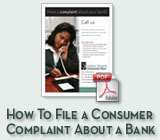
"How do I..."
file a complaint?
First, try to settle the problem directly with your bank or financial institution. This may involve contacting senior bank management or the bank's customer service department. If you cannot resolve the problem with your bank, you can file a complaint online with Federal Reserve Consumer Help.
get answers to other questions?
spot a fraud or scam?
There are many "easy money" or "get rich quick" scams, some that originate outside of the country. Beware of deals or schemes that sound too good to be true. Two good places to start your search are the Frauds and Scams section of this website and Lookstoogoodtobetrue.com, which is sponsored by the Federal Bureau of Investigation (FBI) and the United States Postal Service (USPS). You should also check the website of the Attorney General in your state of residence.
- More information about frauds and scams:
get help if I cannot make my mortgage payments?
If you are having trouble making your mortgage payments, one of the most important things you can do is call your bank or mortgage company and ask for help. The federal banking agencies encourage banks and financial institutions to work with consumers who may be unable to make their payments on their home loans. In addition, the HOPE NOW website contains a list of the nation's largest mortgage lenders and servicers and who to contact for help or you can call the HOPE NOW hotline 1-888-995-HOPE. Also, mortgage crisis prevention help is available through free Department of Housing and Urban Development (HUD) housing counselors. You can find counselors in your area at HUD Approved Housing Counseling Agencies or by calling the HOPE NOW hotline (1-888-995-HOPE). Finally, check our Foreclosure page for more resources.
get a loan or deposit account from the Federal Reserve Bank?
Federal Reserve Banks do not provide banking services, such as offering deposit accounts or lending money, to consumers. The Federal Reserve provides certain financial services to the U.S. Government, depository institutions, and other financial entities. Visit the Federal Reserve Education website for more information about the Federal Reserve and Federal Reserve Banks.
get information about the President's Making Home Affordable Refinance and Modification Options program?
You can get information about the program at www.makinghomeaffordable.gov. The program is part of the Homeowner Affordability and Stability Plan, a federal program to prevent mortgage foreclosures. But, beware! There are organizations charging fees for home loan counseling and applying for loan modifications. The Department of Housing and Urban Development (HUD) and HOPE NOW offer free and safe counseling services and can help you apply for assistance.
know if my bank is safe?
The Federal Deposit Insurance Corporation (FDIC) will help you determine whether your bank is federally insured and the exact amount of your deposit insurance. If you do business with a credit union, you may contact the National Credit Union Administration (NCUA) for the same information. Generally, individual depositors are insured up to $250,000.
get a free copy of my credit report?
The Fair Credit Reporting Act (FCRA) requires all consumer reporting agencies that operate nationally to give you a free copy of your credit report annually, when you ask for one. The nation's three largest consumer reporting agencies have set up a website, a toll free telephone number, and a mailing address that you can use to order your free annual report:
- www.annualcreditreport.com
-
1-877-322-8228
Annual Credit Report Request Service
P.O. Box 105281
Atlanta, GA 30348-5281
voice my opinion about federal consumer protection regulations?
The Federal Reserve Board of Governors (the Board) writes certain consumer protection regulations and asks for public comment on proposed changes. To see a list of the Board's current regulatory proposals, click here. All comments received are posted on the Board's Web site and are considered by Board staff as they make final changes to regulations. You may also provide comments by calling the Board's comment line at (202) 974-7008. Please note that any comments you post on the Board's public Web site will include your name and address, which may be viewed by any Internet user and may be accessed through Web search engines.
Effective July 21, 2011, the Consumer Financial Protection Bureau (the Bureau) has the authority to write and revise certain federal consumer protection laws and regulations related to financial institutions. The Bureau seeks public comment on proposed regulatory changes before they are made. You may voice your opinion on the Bureau Blog or by clicking here. You may also provide comments by calling the Bureau at (202) 435-7000.
know if my mortgage company is licensed?
The Nationwide Mortgage Licensing System Consumer Access (NMLS Consumer Access) is a free service for consumers to confirm that the mortgage company with whom they wish to conduct business is licensed in their state. NMLS Consumer Access contains licensing and registration information about state-licensed mortgage companies and loan originators.
get information on the interest rate used to calculate my loan payments?
For mortgages and other loans, the loan documents you received at closing must state what the interest rate is, whether it will change, and if so, how interest rate changes are calculated.
If you cannot find interest rate information in your loan documents or credit card materials, call your lender. Contact information is usually found on your monthly statement or in your payment book.








